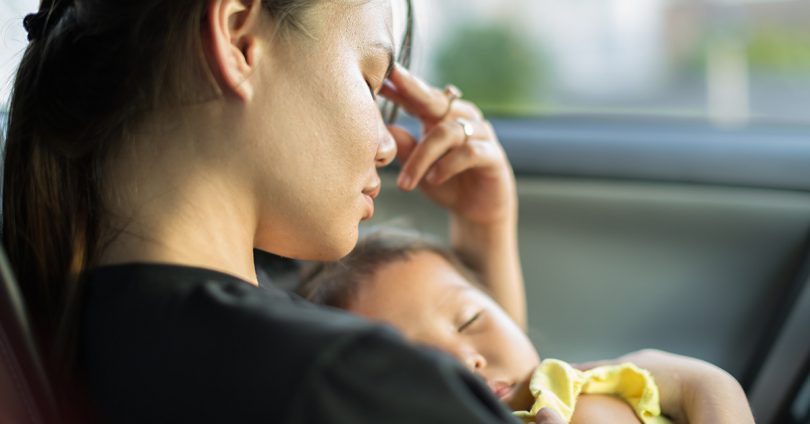Postpartum depression affects as many as one in five people and impacts every culture, age, income level and race. Symptoms may appear any time during pregnancy and during the first 12 months after childbirth.
Advice from our experts:
» What to do if you or your loved one has postpartum depression
» Pregnant or just had a baby? Tips for looking after your mental health
May 5th is World Maternal Mental Health Day – take our quiz* to test your knowledge of postpartum mood and anxiety disorders.
*Sources are Postpartum Support International and PostpartumDads.
- Which of the following is NOT a symptom of postpartum depression?
- Irritability/anger
- Guilt
- Withdrawal from friends/family
- Delegating chores to others
- Lack of energy and motivation
- Headaches
[mks_toggle title=”View the correct answer” state=”close “]
The correct answer is: Delegating chores to others.
[/mks_toggle] - Risk factors for postpartum mental health diagnoses are:
- A family history of mental health
- A preexisting mental health history
- A mental health diagnosis or coping difficulty in pregnancy
- Psychosocial stress including relationship issues, domestic violence, and a lack of social support
- A difficult birth experience, upsetting events and/or separation from your baby in the immediate postpartum period
- All of the above
[mks_toggle title=”View the correct answer” state=”close “]
The correct answer is: All of the above.
[/mks_toggle] - If I am worried that I might have postpartum depression, I should speak with my:
- Family doctor
- Obstetrician
- Midwife
- Public health nurse
- Partner
- Close friend or family member
- Any or all of the above
[mks_toggle title=”View the correct answer” state=”close “]
The correct answer is: Any or all of the above. Plus, call 911 or go to your local emergency room if in crisis.
[/mks_toggle] - Partners can experience postpartum depression and other postpartum mental health issues.
- True
- False
[mks_toggle title=”View the correct answer” state=”close “]
The correct answer is: True.
[/mks_toggle] - Postpartum depression will go away on its own.
- True
- False
[mks_toggle title=”View the correct answer” state=”close “]
The correct answer is: False.
[/mks_toggle] - Untreated depression may have long term effects on children’s health and development.
- True
- False
[mks_toggle title=”View the correct answer” state=”close “]
The correct answer is: True.
[/mks_toggle] - Medications prescribed for postpartum depression are safe if breastfeeding.
- True
- False
[mks_toggle title=”View the correct answer” state=”close “]
The correct answer is: True.
[/mks_toggle] - What is the definition of postpartum blues?
- A mood disorder with symptoms including sadness, frequent crying, feelings of worthlessness, irritability and obsessive thoughts. May occur any time during the first year postpartum.
- A state of well-being in which the individual realizes his or her own abilities, can cope with the normal stresses of life, can work productively and fruitfully and is able to make a contribution to his or her community.
- An adjustment reaction with transient depressed mood that occurs within the first two weeks postpartum and resolves spontaneously.
- The process by which parents form an emotional relationship with their infant over time.
[mks_toggle title=”View the correct answer” state=”close “]
The correct answer is: An adjustment reaction with transient depressed mood that occurs within the first two weeks postpartum and resolves spontaneously.
[/mks_toggle] - What is the definition of postpartum depression?
- A mood disorder with symptoms including sadness, frequent crying, feelings of worthlessness, irritability and obsessive thoughts. May occur any time during the first year postpartum.
- A state of well-being in which the individual realizes his or her own abilities, can cope with the normal stresses of life, can work productively and fruitfully and is able to make a contribution to his or her community.
- An adjustment reaction with transient depressed mood that occurs within the first two weeks postpartum and resolves spontaneously.
- The process by which parents form an emotional relationship with their infant over time.
[mks_toggle title=”View the correct answer” state=”close “]
The correct answer is: A mood disorder with symptoms including sadness, frequent crying, feelings of worthlessness, irritability and obsessive thoughts. May occur any time during the first year postpartum.
[/mks_toggle] - What is the definition of bonding or attachment?
- A mood disorder with symptoms including sadness, frequent crying, feelings of worthlessness, irritability and obsessive thoughts. May occur any time during the first year postpartum.
- A state of well-being in which the individual realizes his or her own abilities, can cope with the normal stresses of life, can work productively and fruitfully and is able to make a contribution to his or her community.
- An adjustment reaction with transient depressed mood that occurs within the first two weeks postpartum and resolves spontaneously.
- The process by which parents form an emotional relationship with their infant over time.
[mks_toggle title=”View the correct answer” state=”close “]
The correct answer is: The process by which parents form an emotional relationship with their infant over time.
[/mks_toggle] - What is the definition of mental health?
- A mood disorder with symptoms including sadness, frequent crying, feelings of worthlessness, irritability and obsessive thoughts. May occur any time during the first year postpartum.
- A state of well-being in which the individual realizes his or her own abilities, can cope with the normal stresses of life, can work productively and fruitfully and is able to make a contribution to his or her community.
- An adjustment reaction with transient depressed mood that occurs within the first two weeks postpartum and resolves spontaneously.
- The process by which parents form an emotional relationship with their infant over time.
[mks_toggle title=”View the correct answer” state=”close “]
The correct answer is: A state of well-being in which the individual realizes his or her own abilities, can cope with the normal stresses of life, can work productively and fruitfully and is able to make a contribution to his or her community.
[/mks_toggle]








